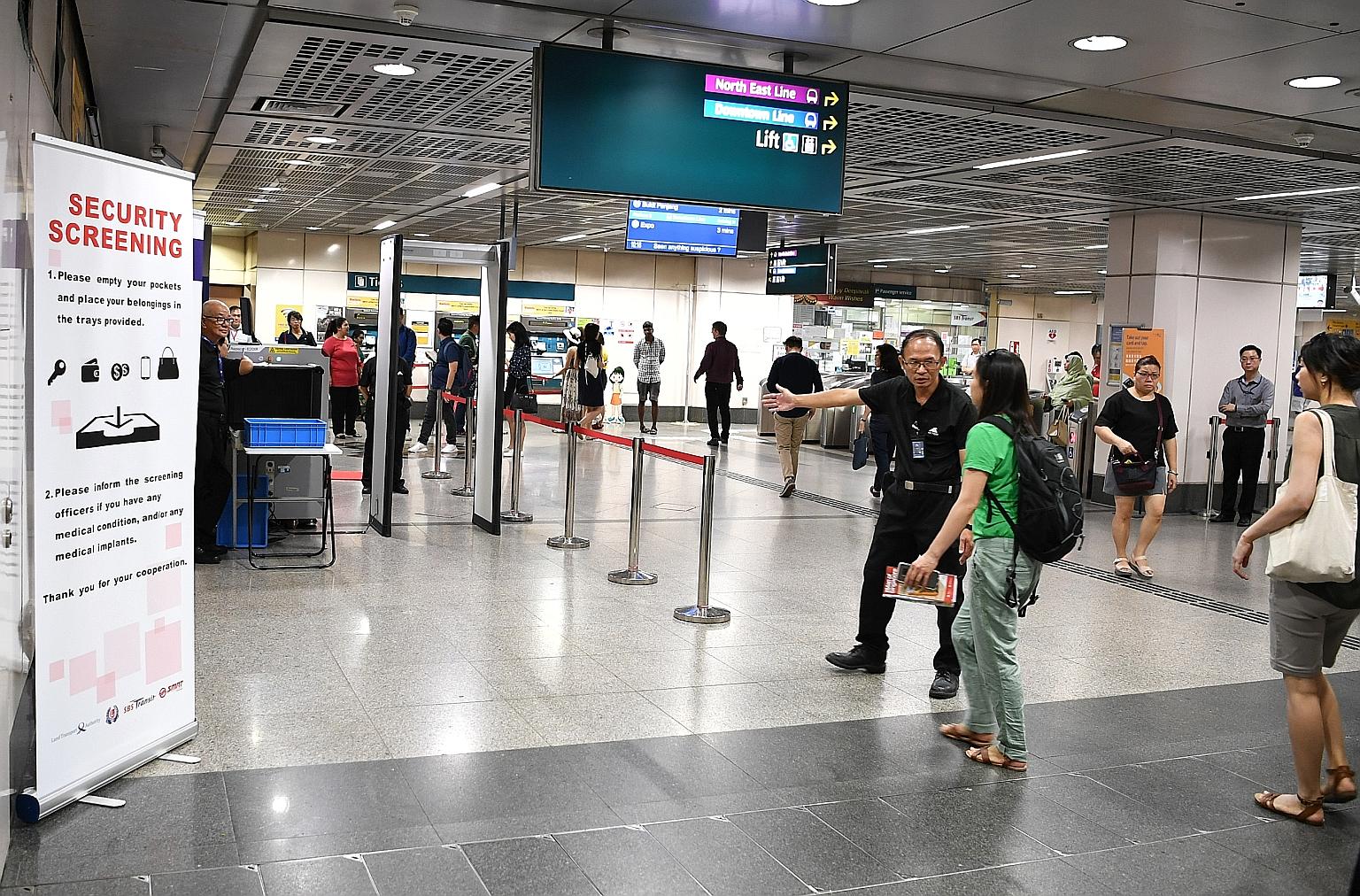Enhanced security checks start at two MRT stations
First day goes smoothly at Little India, Bedok, with most checks finished under 30 seconds
Sign up now: Get ST's newsletters delivered to your inbox

A commuter at Little India MRT station being directed to go through a security screening on the first day of the trial yesterday. The Land Transport Authority said the trial will be conducted at up to six stations across the rail network and that not all commuters will be required to go through the enhanced security screenings.
ST PHOTO: KHALID BABA
Despite concerns about inconvenience, a six-month trial of increased security checks at selected MRT stations here began without a hitchyesterday.
At Little India station on the North East Line and Downtown Line, and Bedok station on the East-West Line, some commuters were required to use a walk-through metal detector and pass their belongings through X-ray scanners before entering the fare gates.
While security equipment was placed at three other stations - Ang Mo Kio and Yishun on the North-South Line, as well as Bukit Panjang on the Downtown Line - these were not in use yesterday.
Their visible presence is to get commuters used to the idea of enhanced security.
The equipment from the five stations will be rotated between different stations during the trial.
When asked to provide more details regarding future screenings, the Land Transport Authority (LTA) said the trial will be conducted at up to six stations across Singapore's rail network.
"These stations are selected at random and will not be disclosed beforehand due to security reasons," said a spokesman for the authority.
The additional screenings run from about 5.30am to midnight - or throughout the trains' opera-tion times.
When The Straits Times visited Little India station between 10am and 10.30am, about 20 people were screened at its entrance on the North East Line, where four Aetos security officers, hired by the LTA, were stationed.
Most checks were completed in under half a minute.
The LTA said that like the bag checks currently conducted at MRT stations here, not all commuters will be required to go through the enhanced security screenings.
"As these checks are random, it will not cause delay to the majority of commuters," said the LTA's public transport security deputy director Joseph Goh.
He said that the security officers are trained to identify potential threats such as bulky bags.
Data collected from the trial - such as how long it takes to screen commuters - will be used to improve the screening process.
The trial is part of the LTA's efforts to review and enhance security on the Republic's rail network, said Mr Goh.
Public transport systems are particularly vulnerable to terror attacks due to the large numbers of people passing through every day, he said, noting that attacks have taken place on other sub-way networks.
In one of the more recent incidents, a suicide bomber last year exploded a device on the St Petersburg metro in Russia that left 15 people dead and 45 injured.
At Bedok, ST observed only one commuter having to go through the extra checks between 11.30am and noon.
Later, during the evening peak period, between 6.30pm and 7.30pm, six people went through screenings at the same station.
By the end of this year, public transport operators will also progressively introduce the use of handheld metal detectors in their security checks at bus interchanges and MRT stations.
Commuters were mixed in their reactions to the added checks.
Ms Ang Sui Tjie, who was screened at the Little India station at 10.30am, worried that it could be disruptive during peak hours.
The 46-year-old, who is currently unemployed, said: "If I have to go through this every time I take the MRT, it would be very in-convenient, especially when I am rushing."
During peak hour, trains arrive at the station every two minutes.
However, manager Subramaniam Balasubramaniam, 45, felt the delays were not too much of a hassle, and said he understood the need for these added measures.
"Having to go through such random checks, I feel safer," he said.
SEE FORUM


